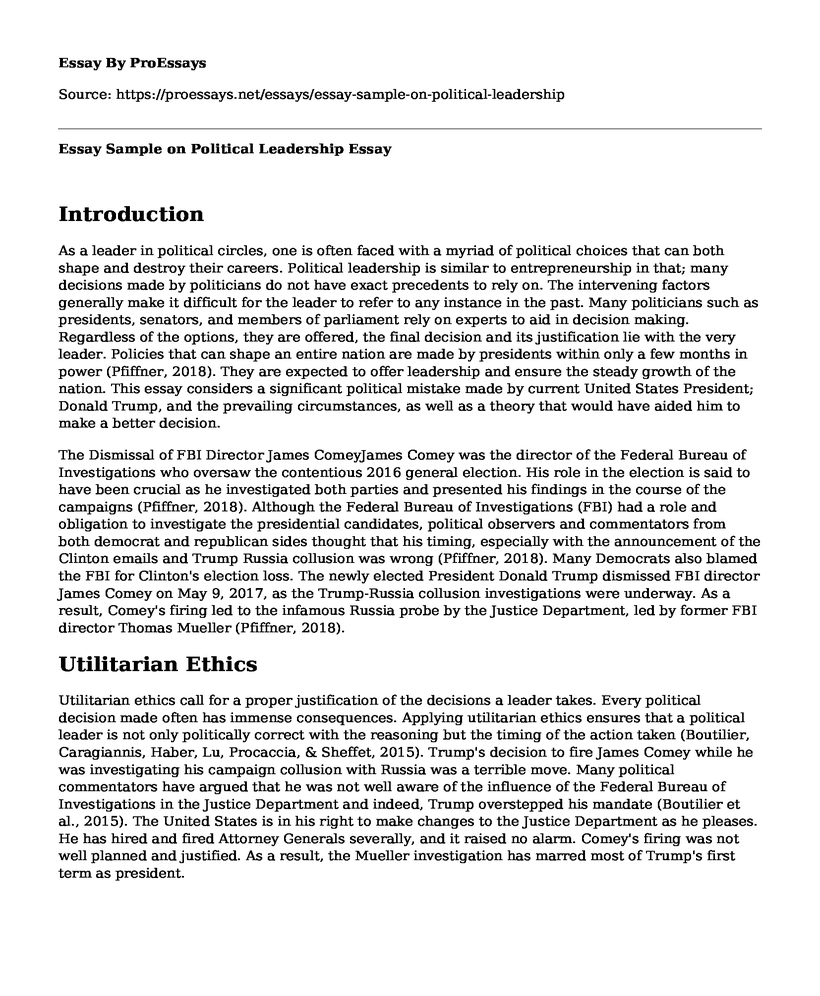Introduction
As a leader in political circles, one is often faced with a myriad of political choices that can both shape and destroy their careers. Political leadership is similar to entrepreneurship in that; many decisions made by politicians do not have exact precedents to rely on. The intervening factors generally make it difficult for the leader to refer to any instance in the past. Many politicians such as presidents, senators, and members of parliament rely on experts to aid in decision making. Regardless of the options, they are offered, the final decision and its justification lie with the very leader. Policies that can shape an entire nation are made by presidents within only a few months in power (Pfiffner, 2018). They are expected to offer leadership and ensure the steady growth of the nation. This essay considers a significant political mistake made by current United States President; Donald Trump, and the prevailing circumstances, as well as a theory that would have aided him to make a better decision.
The Dismissal of FBI Director James ComeyJames Comey was the director of the Federal Bureau of Investigations who oversaw the contentious 2016 general election. His role in the election is said to have been crucial as he investigated both parties and presented his findings in the course of the campaigns (Pfiffner, 2018). Although the Federal Bureau of Investigations (FBI) had a role and obligation to investigate the presidential candidates, political observers and commentators from both democrat and republican sides thought that his timing, especially with the announcement of the Clinton emails and Trump Russia collusion was wrong (Pfiffner, 2018). Many Democrats also blamed the FBI for Clinton's election loss. The newly elected President Donald Trump dismissed FBI director James Comey on May 9, 2017, as the Trump-Russia collusion investigations were underway. As a result, Comey's firing led to the infamous Russia probe by the Justice Department, led by former FBI director Thomas Mueller (Pfiffner, 2018).
Utilitarian Ethics
Utilitarian ethics call for a proper justification of the decisions a leader takes. Every political decision made often has immense consequences. Applying utilitarian ethics ensures that a political leader is not only politically correct with the reasoning but the timing of the action taken (Boutilier, Caragiannis, Haber, Lu, Procaccia, & Sheffet, 2015). Trump's decision to fire James Comey while he was investigating his campaign collusion with Russia was a terrible move. Many political commentators have argued that he was not well aware of the influence of the Federal Bureau of Investigations in the Justice Department and indeed, Trump overstepped his mandate (Boutilier et al., 2015). The United States is in his right to make changes to the Justice Department as he pleases. He has hired and fired Attorney Generals severally, and it raised no alarm. Comey's firing was not well planned and justified. As a result, the Mueller investigation has marred most of Trump's first term as president.
Conclusion
Political leadership is a complicated balance of principles and radical decisions. Leaders like President Trump often face many dilemmas in the course of their leadership. Some of these decisions can lead to grave consequences. The firing of FBI director James Comey is probably one decision President Trump may regret (Pfiffner, 2018). Regardless, all leaders make political mistakes. It is important however to employ particular models and theories to base all of one's decisions in both leadership and business. The utilitarian theory of ethics calls for a leader to clearly evaluate the outcomes of all their decisions before deciding the option to pick among a set of possible alternatives. Trump would have probably not fired Comey at the time had he used utilitarian reasoning.
References
Boutilier, C., Caragiannis, I., Haber, S., Lu, T., Procaccia, A. D., & Sheffet, O. (2015). Optimal social choice functions: A utilitarian view. Artificial Intelligence, 227, 190-213. Retrieved from http://www.cs.cmu.edu/~./arielpro/papers/optvoting.aij.pdf
Pfiffner, J. P. (2018). The Contemporary Presidency: Organizing the Trump Presidency. Presidential Studies Quarterly, 48(1), 153-167. Retrieved from https://onlinelibrary.wiley.com/doi/pdf/10.1111/psq.12446
Cite this page
Essay Sample on Political Leadership. (2022, Dec 13). Retrieved from https://proessays.net/essays/essay-sample-on-political-leadership
If you are the original author of this essay and no longer wish to have it published on the ProEssays website, please click below to request its removal:
- Cultural Elements and the Implementation of Change Essay Example
- Essay Example on Karl Marx's on the Jewish Question: Critiquing Bauer's Studies
- Essay Example on Day-to-Day Decisions in Companies: Short & Long-Term Effects
- Paper Example on Creative Leadership: Understanding & Practicing Diversity
- Paper Example on My HRM Journey: From Class Leader to Professional Manaager
- Research Paper on Strategizing Leadership in Water/Wastewater Industry Programs
- Paper Example on Ammianus: Moralizing Leadership for Roman Empire Change







